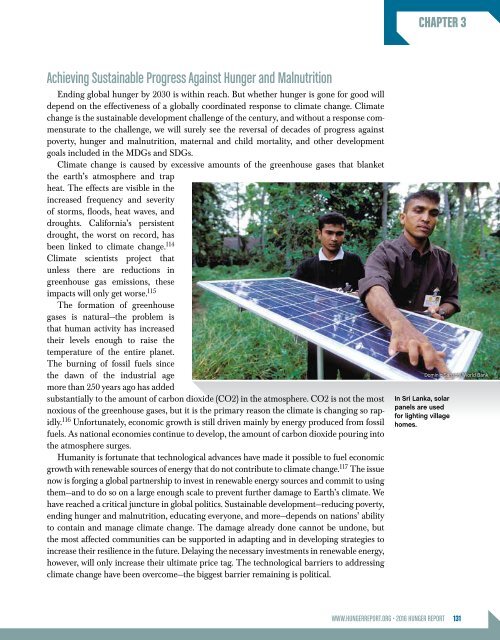THE NOURISHING EFFECT
HR2016-Full-Report-Web
HR2016-Full-Report-Web
You also want an ePaper? Increase the reach of your titles
YUMPU automatically turns print PDFs into web optimized ePapers that Google loves.
CHAPTER 3<br />
Achieving Sustainable Progress Against Hunger and Malnutrition<br />
Ending global hunger by 2030 is within reach. But whether hunger is gone for good will<br />
depend on the effectiveness of a globally coordinated response to climate change. Climate<br />
change is the sustainable development challenge of the century, and without a response commensurate<br />
to the challenge, we will surely see the reversal of decades of progress against<br />
poverty, hunger and malnutrition, maternal and child mortality, and other development<br />
goals included in the MDGs and SDGs.<br />
Climate change is caused by excessive amounts of the greenhouse gases that blanket<br />
the earth’s atmosphere and trap<br />
heat. The effects are visible in the<br />
increased frequency and severity<br />
of storms, floods, heat waves, and<br />
droughts. California’s persistent<br />
drought, the worst on record, has<br />
been linked to climate change. 114<br />
Climate scientists project that<br />
unless there are reductions in<br />
greenhouse gas emissions, these<br />
impacts will only get worse. 115<br />
The formation of greenhouse<br />
gases is natural—the problem is<br />
that human activity has increased<br />
their levels enough to raise the<br />
temperature of the entire planet.<br />
The burning of fossil fuels since<br />
the dawn of the industrial age<br />
more than 250 years ago has added<br />
substantially to the amount of carbon dioxide (CO2) in the atmosphere. CO2 is not the most<br />
noxious of the greenhouse gases, but it is the primary reason the climate is changing so rapidly.<br />
116 Unfortunately, economic growth is still driven mainly by energy produced from fossil<br />
fuels. As national economies continue to develop, the amount of carbon dioxide pouring into<br />
the atmosphere surges.<br />
Humanity is fortunate that technological advances have made it possible to fuel economic<br />
growth with renewable sources of energy that do not contribute to climate change. 117 The issue<br />
now is forging a global partnership to invest in renewable energy sources and commit to using<br />
them—and to do so on a large enough scale to prevent further damage to Earth’s climate. We<br />
have reached a critical juncture in global politics. Sustainable development—reducing poverty,<br />
ending hunger and malnutrition, educating everyone, and more—depends on nations’ ability<br />
to contain and manage climate change. The damage already done cannot be undone, but<br />
the most affected communities can be supported in adapting and in developing strategies to<br />
increase their resilience in the future. Delaying the necessary investments in renewable energy,<br />
however, will only increase their ultimate price tag. The technological barriers to addressing<br />
climate change have been overcome—the biggest barrier remaining is political.<br />
In Sri Lanka, solar<br />
panels are used<br />
for lighting village<br />
homes.<br />
Dominic Sansoni/World Bank<br />
WWW.HUNGERREPORT.ORG • 2016 HUNGER REPORT 131


